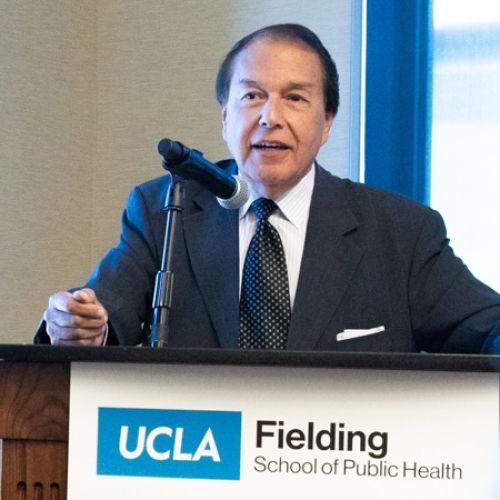UCLA Fielding alum brings a public health focus to her clinical work and research
In three recent and related studies, Dr. Fola May (PhD, ’15), highlighted current challenges in colorectal cancer prevention.

As an early-career physician specializing in gastroenterology more than a decade ago, Dr. Folasade (Fola) May found herself fascinated by colorectal cancer, the second leading cause of cancer-related deaths in the U.S. among men and women combined.
“This is a disease that - unfortunately - kills people every day in this country and world and now is increasing among young adults, despite being largely preventable,” said May, a UCLA Fielding School of Public Health (PhD, ’15) graduate. “When I was in my medical training, we would only diagnose colorectal cancer in people in their 60s, 70s, and 80s, and now we're seeing this disease in people in their 30s, 40s, and 50s. It also disproportionately impacts people of color, so I feel fortunate that I came across it and its newer challenges when I did - exactly when we needed to increase awareness and remove the stigma from talking about it.”
Over the past decade, May has combined her work as a clinician – a doctor working with patients in the Greater Los Angeles Veterans Affairs Medical Center (VA) – with cancer research as a scientist at the UCLA Health Jonsson Comprehensive Cancer Center.
Her research focus has been on trends and variations in colorectal cancer screening rates across different population groups, and developing interventions to increase colorectal cancer prevention and early detection. Three recent studies co-authored by May make clear current clinical challenges in colorectal cancer and offer effective techniques to encourage screening.
The three peer-reviewed studies, with co-authors affiliated with UCLA, the VA, UC San Diego, Carnegie Mellon University, Guardant Health, the American Cancer Society, and the University of Maryland, include:
- “Population Health Colorectal Cancer Screening Strategies in Adults Aged 45 to 49 Years,” in the Journal of the American Medical Association (JAMA), published by the American Medical Association, in August, 2025;
- “Colonoscopic Follow-Up After Abnormal Blood-Based Colorectal Cancer Screening Results,” in the journal Gastroenterology, published by the American Gastroenterological Association, in July, 2025;
- “Black–White disparities across the colorectal cancer care continuum in the USA,” in the journal Nature Reviews Gastroenterology & Hepatology, published in July, 2025.
The Nature study found that although overall colorectal cancer rates have declined over the past four decades, the decline has been slower among Black Americans, resulting in a persistently higher burden of disease, despite proven strategies to increase preventative care, screening, and treatment. Incidence and mortality rates remain about 20% and 30% higher, respectively, for Black individuals compared with White individuals in the U.S., the researchers found.
The Gastroenterology study found that while blood-based screening tests offer a more convenient option for colorectal cancer screening, only 49% of patients with an abnormal result completed a follow-up colonoscopy within six months - a step necessary to rule out pre-cancers and cancers. The study also found that unlike prior analyses of non-invasive screening tests, race and ethnicity were not significant predictors of follow-up after an abnormal result.
The JAMA study was a large trial at UCLA that aimed to increase colorectal cancer screening participation among adults age 45 to 49, the group most recently eligible for colorectal cancer screening. Interestingly, the study found that simply mailing a stool-based screening test directly to people's homes was the most effective strategy to increase screening rates. Only about 15% to 17% of people completed screening when they had to actively opt into screening or pick a screening test, but when an at-home test was automatically mailed to them, more than 26% got screened.
One of the baseline findings in May’s work is that in healthcare systems where equal access to all eligible users is a standard, like the Veterans Health Administration, racial disparities in screening simply do not exist, suggesting that access to care, elimination of cost burdens, and integration of services are foundational for screening. In that sense, May's combination of physician and researcher brings real-world experience to bear on health care issues – and solutions.
“What we discover and create at UCLA - with the help and support of federal grants - doesn’t just stay within the walls of our labs or classrooms,” said Dr. Elizabeth Yano, professor in the UCLA Fielding School’s Department of Health Policy and Management and a senior health research scientist with the Veterans Affairs Los Angeles Healthcare System. “Her work reaches real people and real lives, often in transformative ways, and Dr. May is a great example of a physician-scientist whose work has had very real, and very positive, impacts on patients and their care.”
May, for her part, credits her status as a medical doctor (Harvard Medical School, ’07) and research scientist, including her experience at UCLA Fielding, for simply making her life’s work that much more impactful.
“The opportunity to study at Fielding was career-changing for me,” she said. “I could have continued seeing patients with the majority of my time, and that would have had an impact, but getting the very specified education, mentorship, and research training that I did afforded me the opportunity to do work that benefits entire populations. That’s incredibly rewarding.”
Funding
The studies referenced above were supported, in part, by federal grants and resources from the U.S. Department of Veterans Affairs and the Veterans Health Administration, the National Cancer Institute, and the National Institutes of Health, as well as philanthropic and academic support. The content of the studies is solely the responsibility of the authors and does not represent the views of the Department of Veterans Affairs or the U.S. Government.

